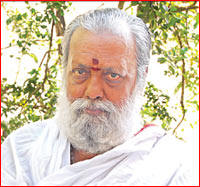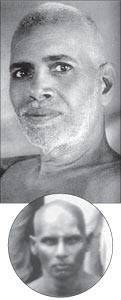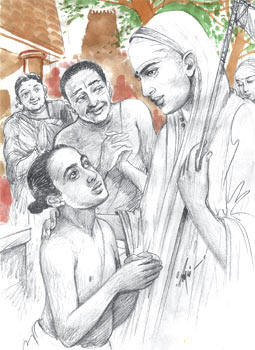Sakti
Vikatan
12 Jul, 2011
SriRamana Maharishi
 When
SriSankara Jagatguru was travelling west, he visited a village, where a
Brahmana by name Prabhakar lived. He took his grandson and made him pay
respects to Sankara. The boy was suffering from delayed speech,
disinterested, immature and free of likes and dislikes.
When
SriSankara Jagatguru was travelling west, he visited a village, where a
Brahmana by name Prabhakar lived. He took his grandson and made him pay
respects to Sankara. The boy was suffering from delayed speech,
disinterested, immature and free of likes and dislikes.
Sankara embraced the boy and questioned him, “Dear boy, who are you?
Whose son are you? Where are you going? What is your name? Where
have you come from?”
The slokas he uttered to Sankara constitute Hastamalaka in Sanskrit,
which Bhagavan translated in Tamil.
I
am neither man, nor God, Yaksa, Brahmin, kshatriya, Vaiśya, Sudra,
Brahmacharin, householder, forest-dweller, sannyasi…; but I am pure
awareness alone. Narrating in negations, he described Āṉmā in Slokas.
If one understands me as one in many forms spread all over the world,
how will he interact with others?
What is the difference between him and others? If all differences
disappear and one shines as all, that Āṉma is I.
This is the explanation offered
by SriRamana Maharishi.
‘The reflections of moon dance
on the waves. The moon is not dancing. This is the optical illusion.
Buddhi (intellect) has the same illusion and thinks an individual as a stranger,
belonging to a different religion, clan, family… It separates one as
high and the other as low. Buddhi’s play is the perception of Māyā.
What is common to and residing in all is non-different. What is in you,
pervades all. I am the Āṉma that understands this.’

Bhagavan SrīRamaṇa Maharishi translated this episode in a very subtle
manner.
Ramana Maharishi who lived in
the cave wearing a loincloth with a few conveniences, explicates these
poems with ease, simplicity and clarity to the deserving devotees.
Is Bhagavan a beggar or prosperous person eating and living on food
given by unknown people?
But he had immense wealth. What could that be? People came seeking that
(spiritual) wealth like paupers.
Why, even the rich came like paupers with opposed palms.
SriRamaṇa Maharishi’s translations were in the old Tamil. Reading and
comprehending them are hard. If you parse the words and they make an
impress on you, his translations are illuminating.
What Ramanar says in the realm
of spirit, is his biography.
Jñānis have fewer necessities. If the necessity arises, the sought-after
object comes easily seeking him. Bhagavan had no strong physique.
He was constipated because of irregular eating habits,
disinterest in foods, and sitting in meditation for long periods of
time.
Because of ‘body heat,’ he used to cough. Since he sat amid rocks, his
body temperature was higher. He used to keep gallnut in his mouth.
He ate the soaked and softened gallnut, which is good for cough,
constipation and body-cooling. When the Virūpākṣi cave ran out of
gallnuts, his caretaker Pazhaṉisāmi sent the word to Sēṣaiyar for
restocking of the gallnuts. Sēṣaiyar who always made supplies available
to Ramanar simply stopped supplying gallnuts for some unknown reason.
Bhagavan had eczema, asthma and titubation of the head. He used to get
intermittent toothache. Bhagavan used to tell Pazhaṉisāmi to bring
gallnuts when he went to the foothills. Regular visitor
Ādimūlam
with his friends from a nearby village came
to the cave to greet Periyava. One day he sat for a little while and
when he was about to leave asked Pazhaṉisāmi, “Do you need gallnuts?”
Surprised, Pazhaṉisāmi said, “Yes.” He brought a bagful of gallnuts,
gave it to Pazhaṉisāmi and said, “Keep them.” Pazhaṉisāmi kept the
needed amount and returned the rest to Ādimūlam.

Pazhaṉisāmi: “I assume the nuts lay scattered on the ground, falling
from the open bag in the cart.
My friends and I collected the nuts in a bag and brought it here.
We thought you might need them.
That is why I asked you thus.” Who
gave the gallnuts to Bhagavan? Is it Ādimūlam? Is it from the cart with
unsecured bag of nuts? Is it someone else? This is anugraham
(favor) by the Lord. God helps the Jñānis so they do good to us.
Sēṣaiyar brothers had love for Bhagavan. When Bhagavan asked for
raisins, Pazhaṉisāmi answered, “Not available.”
Sēṣaiyar’s brother in Chennai usually brought raisins for Bhagavan. In
the past, he could find only moist raisins. All the shops were closed
that day except one. The shopkeeper asked Sēṣaiyar whether he would be
interested to buy dry raisins. He bought 3.125 pounds of dry raisins and
took it to Virūpākṣi cave for Bhagavan’s use. Raisins were available to
Bhagavan by happenstance the day he asked for it.
He had toothache. What to do? According to local lore, tobacco leaves
applied firmly on the offending tooth kill the bacteria. Nobody had
tobacco leaf. One devotee
visiting with Bhagavan had snuff. Snuff applied on the aching tooth
relieved the pain. The decay on
the tooth was huge. A dentist came from Chennai pulled the offending
tooth and charged 300 rupees. Ailments and troubles came to Bhagavan as
they occur to others. In case of Bhagavan, the troubles disappeared
without leaving ‘footprints’ (sequelae) as if someone took care of them.
Jñānis suffer pain and hunger like everybody else. Then, in what manner
the Jñānis are different and lofty? There
are questioners like that. Pain and hunger are body-related.
Jñāni
suffers but does not complain. Jñāṉi’s nature is to accept the fate
(discomfort, illness, needs…), which people find hard to tolerate.
Let us get Darśan.
Ramana_Maharshi
Hastamalaka Stotra
on: April 30, 2010, 01:04:43 PM »
Introduction by Sri Bhagavan Ramana Maharshi
http://www.arunachala-ramana.org/forum/index.php?topic=5175.0
When Shankara, the Guru of the world, was travelling in the western
parts of India and overcoming in debate the expounders of the various
schools of thought, he once came to a village known as Srivali. When a
brahmin inhabitant of the village named Prabhakara heard about his
arrival he went to him with his thirteen year old son. He prostrated
before Sankara and made his son also prostrate. He then explained that
the boy had been dumb from his childhood, that he had no likes and
dislikes, nor a sense of honour and dishonour, and that he was
completely inactive. The Guru then raised the boy up and asked him as
follows in a cheerful tone:
Text
1. `Who are you? Whose child are you? Whither are you bound? What is
your name? Whence have you come? Oh Child! I should like to hear your
reply to these questions.' Thus spoke Sri Shankaracharya to the boy, and
Hastamalaka replied as follows.
2. I am neither man, God, yaksha, brahmin, kshatriya,vaisya, sudra,
brahmachari, householder, forest-dweller, nor sannyasi; but I am pure
awareness alone.
3. Just as the sun causes all worldly movements, so do I -- the
ever-present, conscious Self -- cause the mind to be active and the
senses to function. Again, just as the ether is all-pervading, yet
devoid of any specific qualities, so am I free from all qualities.
4. I am the conscious Self, ever-present and associated with everything
in the same manner as heat is always associated with fire. I am that
eternal, undifferentiated, unshaken Consciousness, on account of which
the insentient mind and senses function, each in its own manner.
5. I am that conscious Self of whom the ego is not independent as the
image in a mirror is not independent of the object reflected.
6. I am the unqualified, conscious Self, existing even after the
extinction of buddhi, just as the object remains ever the same even
after the removal of the reflecting mirror.
7. I am eternal Consciousness, dissociated from the mind and senses. I
am the mind of the mind, the eye of the eye, ear of the ear and so on. I
am not cognizable by the mind and senses.
8. I am the eternal, single, conscious Self, reflected in various
intellects, just as the sun is reflected on the surface of various
sheets of water.
9. I am the single, conscious Self, illumining all intellects, just as
the sun simultaneously illumines all eyes so that they perceive objects.
10. Only those eyes that are helped by the sun are capable of seeing
objects, not others. The source from which the sun derives its power is
myself.
11. Just as the reflection of the sun on agitated waters seems to break
up, but remains perfect on a calm surface, so also am I, the conscious
Self, unrecognizable in agitated intellects though I clearly shine in
those which are calm.
12. Just as a fool thinks that the sun is entirely lost when it is
hidden by dense clouds, so do people think that the ever-free Self is
bound.
13. Just as the ether is all-pervading and unaffected by contact, so
also does the ever-conscious Self pervade everything without being
affected in anyway. I am that Self.
14. Just as a transparent crystal takes on the lines of its background,
but is in no way changed thereby, and just as the unchanging moon on
being reflected on undulating surfaces appears agitated, so is it with
you, the all-pervading God.
15. As this stotra reveals the Self as clearly as the amalaka fruit
placed on the palm of the hand (hasta), it received the name Hastamalaka
Strotra. Moreover, the boy, eminent in jnana, came to be praised by all
people of this world as Hastamalaka.
The father of the boy was speechless with wonder at those words. But the
Acharya said to him: `He has become your son because of his incomplete
austerities. This is your good fortune. He will not be of any use to you
in this world. Let him stay with me.' He bade him go back and, taking
the boy with him, proceeded on his way. The disciples then asked him:
`How did this boy attain the state of Brahman without hearing, etc.?'
The Guru replied: `His mother left her two year old child in the care of
a great and highly accomplished yogi who was practising austerities on
the bank of the Yamuna while she went to bathe in the river with some
women. The child toddled towards the water and was drowned. Out of his
compassion for the disconsolate mother the sadhu forsook his body and
entered that of the child. That is why this boy has attained this high
state.'
Sources:
1) COLLECTED WORKS OF SRI RAMANA MAHARSHI BOOK
2)
http://ramana-collected-works.blogspot.com/2007/06/hastamalaka-stotra.html
The Hastamalaka
Translated by
E.B. Cowell
http://www.sankaracharya.org/hastamalaka.php
1. 'Who art thou, my child, and whose, and
whither goest thou? What is thy name, and whence art thou come? Tell me
all this clearly to gladden me,--thou fillest my heart with gladness.'
2. 'I am not a man nor a god nor a demi-god, no Brahman, Kshatriya,
Vaisya, nor sudra; no student, nor householder, nor anchorite, nor
religious mendicant; innate Knowledge am I.
3. 'That which is the cause of the action of mind, eye, and the rest, as
the sun is the cause of the movements of living beings, but which itself
is void of all conditioning disguises, like the infinite ether,--that
Soul, essentially eternal perception, am I.
4. 'That which being itself one, unchangeable, and essentially eternal
knowledge (as fire is essentially heat), is the substratum which bears,
as they act, the mind, eye, and the rest,--which are mere
Ignorance,--that Soul, essentially eternal perception, am I.
5. 'The reflection of the face seen in the mirror is nothing in itself
as separated from the face, so is the personal soul in itself nothing,
the reflection of Intelligence on the internal organ,--that Soul,
essentially eternal perception, am I.
6. 'As the reflection vanishes when the mirror is not, and the face
remains alone, apart from all delusion, so that Soul which remains
without a reflection when the understanding is not,--that Soul,
essentially eternal perception, am I.
7. 'That which abiding aloof from mind, eye, and the rest, is itself
mind, eye, and the rest to mind, eye, and the rest, and whose nature
mind, eye, and the rest cannot reach,--that Soul, essentially eternal
perception, am I.
8. 'That which, being one, shines forth self-manifested, possessing pure
intelligence, and itself essential Iight, and which yet appears as
though variously modified in various internal organs, as the one sun
shines reflected in the water of different vessels--that Soul,
essentially eternal perception, am I.
9. 'As the sun, illumining countless eyes, illumines at the Same moment
the object to each, so that Soul, the one intelligence, which illumines
countless internal organs,--that Soul, essentially eternal perception,
am I.
10. 'As the bodily sense illumined by the sun grasps the form of the
object, but when unillumined grasps it not, so that by which the one sun
must be itself illumined to illumine the sense,--that Soul, essentially
eternal perception, am I.
11. 'As the one sun seems many in the agitated waters, and even when
reflected in still waters must be yet recognized as really separate, so
that which, though really one, seems many in the restless internal
organs,--that Soul, essentially eternal perception, am I.
12. 'As he whose eye is covered with a cloud thinks in his delusion that
the sun is clouded and has lost its light, so that soul which seems
bound to him whose mind's eye is blind,--that Soul, essentially eternal
perception, am I.
13 'That which being in itself one, is strung through all things and
with which nothing ever yet comes in contact, and which, like the ether,
is always pure and uncontaminated in its nature,--that Soul, essentially
eternal perception, am I.
14. 'As the pure crystals appear different by the presence of a
disguiser, so thou too appearest different by the diversity of
individual minds; as the moonbeams appear to be tremulous in the water,
so thou too, O Vish.nu, appearest to flicker in our world!'

